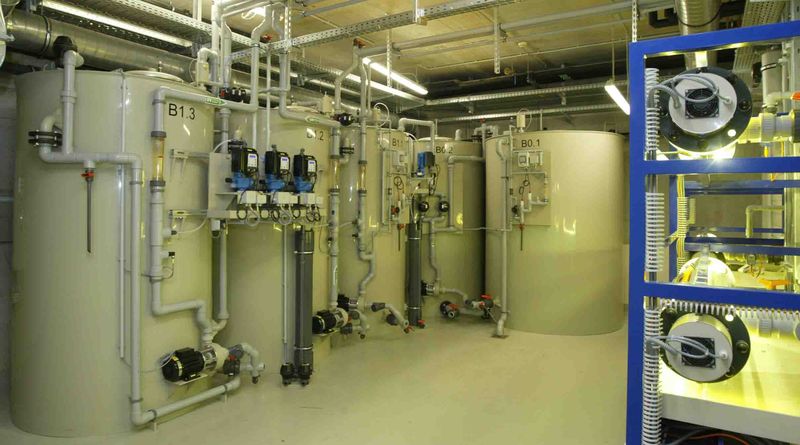uv reactors, photo-oxidation, advanced oxidation (aop), recycling & engineering
for industrial use
UV-applications
Advanced Oxidation Processes (AOP)
Photo-Fenton-Process for wastewater treatment
Photo Fenton Oxidation for Wastewater Treatment Replaces Fenton Oxidation: Less Sludge and Lower Cost of Ownership!

For wastewaters with a special constitution we apply Photo-Fenton-type reactions to achieve the best overall performance in wastewater treatment. Our specially designed foto-fenton-process combines a low chemical consumption with a high degradation rate.
The advantages of the photo-Fenton AOP compared to the Fenton process are significantly lower operating costs, the absence of the filter press(es) and a much higher degradation rate of the Photo-Fento oxidation compared to the Fenton oxidation. Furthermore, the Photo-Fenton process can be largely automatic, unlike a Fenton process, which will always remain highly manual, as even an "automatic" filter press always requires a lot of manual intervention - the difference between theory and practice. Furthermore, a Fenton plant is getting silted up over time and maintenance is increasing significantly to keep it operational.
Wherever recalcitrant organic systems and even aromatic structures are present, photo-Fenton-oxidation as AOP has gigantic advantages, since photo-oxidation quickly and effectively breaks down organic compounds and makes them more readily accessible to further oxidation.
Table: Comparison of Fenton and Foto-Fenton
| Topic | Fenton-Oxidation | Photo-Fenton-Oxidation (AOP) |
| Process | Fe(2+)+H2O2 --> Fe(3+) + 1 OH-Radical + 1 OH- Partially organic is sorbed on the FeOOH sludge (separate disposal) | H2O2 + UV --> 2 OH-Radicals Further degradation reactions due to photolysis |
| Formation of reactive species | 1 radical per H2O2 Double H2O2 consumption in comparison to UV / H2O2 (at the same degree of degradation) | 2 radicals per H2O2 |
| Treatment efficiency | Usually limited to max. 65%, | Generally not limited by the chemsitry of the oxidation process, but in some cases extreme degradation rates not economic |
| Advantages | Simple installation | Strong performance |
| Disadvantage | Formation of sludge | Typically sligtly higher CAPEX |
| Automation | Automatic Fenton is not simple to realize, especially automatic sludge separation and handling | Foto-Fenton-Oxidation is an easy to automate AOP |







